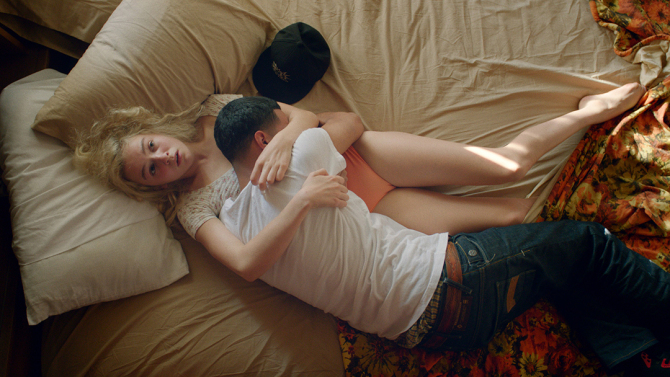‘White Girl’ From the title on down, it seems like “White Girl” can’t wait for you to hashtag it “#problematic.” It’s a movie where a lilywhite lass drops into a pre-gentrified part of Queens and hooks up with Latino stereotypes. They’re of the drug dealing variety (of course) and they can’t wait to make it with some hotcha suburbanite who doesn’t know any better. Which reminds us, it’s also very old school: the fleshy shocker about girls gone wild — a treat for reactionary types as well as pervs (in some cases they may be both). Printed out like that, cold and clinical, it sounds like “White Girl” was made to fuel untold outrage articles. Watching it unfold is another thing. It’s clear from the start that it’s more compassionate than calculated (though still always a little bit #problematic). This isn’t some “Kids” knockoff, where the characters are just infrequently clothed bodies, there to swallow booze and drugs while we gasp and leer. They’re real characters. That’s partly due to writer-director Elizabeth Wood, who based the story on her youthful pulchritude and is clearly working through issues impossible to resolve. And it’s also thanks to star Morgan Saylor (“Homeland”), who’s able to make her character both foolish and legitimately curious, staring at a new and combustible world with suspicion and hungry excitement. RELATED: Interview: Aaron Paul on “The 9th Life of Louis Drax” and loving dark children’s films That’s good, because we might otherwise be primed to read her as just a stupid white girl — a bubbleheaded omen of gentrification and destruction. “White Girl” isn’t 10 minutes old and Saylor’s Leah — newly arrived in Bushwick-adjacent Ridgewood with a week to burn before starting at the New School — has let her bro-ish magazine boss (Justin Bartha) get to home base in his office. It’s a complicated scene that could have been simple: It’s not simply that she’s used by a gross male power figure. It’s clear from Saylor’s face that Leah’s both deeply uncomfortable and and turned-on. She’s aware that she’s been used and suddenly aware that she can be used for her own personal gain. Most of the men in “White Girl” will have their way with Leah, but the only relationship that’s actually a relationship is the one she forges with Blue (Brian “Sene” Marc), a Puerto Rican dealer on her block. At first their dalliance is built on mutual exoticism: She thinks it’s fun that he’s the type of guy she probably saw on “The Wire,” while he thinks it’s fun to hook up with the slutty new white girl. But their love does become real — real enough that, when he’s suddenly busted and thrown in jail, she’ll do anything to get him out, even, of course, setting herself up for more horndog male abuse. The sincerity of this relationship — and of Saylor’s performance, gentle and observant even she’s gone coked-up and lewd — helps temper what would play like an R-rated After School Special about the dangers of the city. There’s no defending that all the Latino men are Donald Trump nightmares, though Blue is, after Leah, the film’s most complicated and fleshed-out character. Wood has some horrific stuff in store for them, and Goes Too Far at least twice. (When Chris Noth pops up as a lawyer who might help Leah get Blue out of the slammer, the only tension is when he’ll booze her up and have his way.) “White Girl” means it, though, and isn’t only about exploitation. It sees everything as a double-edge sword, where characters can be stereotypes but also real people, where a girl can be used and want to be used, where a salacious movie about a white girl doing drugs can seek to shock and illuminate. It’s more thoughtful and more disturbing than a movie that just wants to disturb.
Director: Elizabeth Wood
Stars: Morgan Saylor, Brian “Sene” Marc
Rating: R
3 (out of 5) Globes
‘White Girl’ is more than a movie about youths gone wild

FilmRise
Follow Matt Prigge on Twitter @mattprigge

















